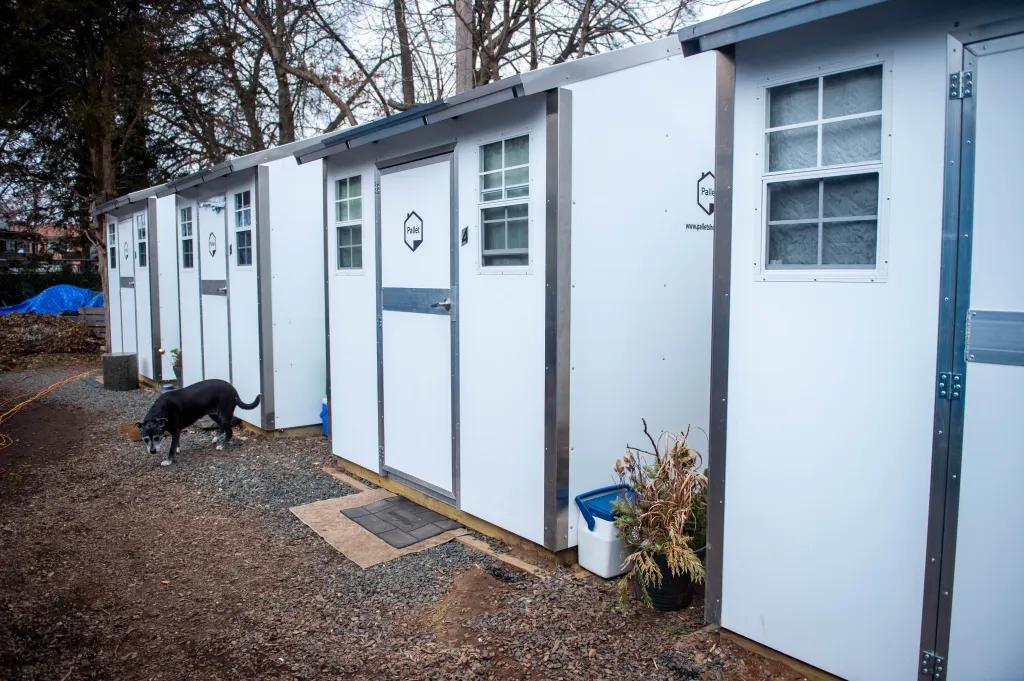Copyright Hartford Courant

Advocates at a homeless encampment of tents and tiny houses, known as Rosette Village, are asking elected officials to do more to help them work through government regulations to get their heat turned on before the weather gets colder this winter. New Haven officials had cut off electricity, which powers heating in the encampment, citing zoning and building code violations. The encampment is situated in the backyard of a house on Rosette Street in New Haven’s Hill neighborhood. The village’s organizers, Mark Colville and his wife Luz Catarineau, live in the house. It’s similar in concept to other communities that have been created around the country, including one called Dignity Village in Portland. The idea is to shift the culture around homelessness and think of unhoused people as neighbors rather than problems to be dealt with, Colville said. But the program has come into conflict with the city. When Rosette Village installed the tiny homes in October 2023, they did so without building permits. City officials said they were violating regulations and cut off electricity to the development in 2023. The village has since gotten easements from the city Board of Zoning and Appeals, but it then ran into conflict with the state building code. That code requires that dwellings have kitchens and bathrooms. The tiny homes have neither. Residents use the kitchen and bathroom inside Colville and Catarineau’s house, said Colleen Shaddox, a volunteer with the organization. Village advocates have gone back and forth over months with the city about the electricity, which was turned back on again in early 2024, then off later in the year. Residents fear they won’t have heat this winter. In a first for CT, a tiny home community grows in a backyard. Will it drive policy change across the state? Lenny Speiller, a spokesperson for the city, said the state Department of Administrative Services and Building Inspector have said the structures don’t meet minimum safety requirements including structural strength for wind and slow loads, fire resistance-rated walls and sanitary provisions. The homes were issued permits in January 2024 as temporary structures, which are only supposed to be up for 180 days, Speiller added. On Monday, progressive members of the state legislature spoke at a press conference with the Rosette Village Neighborhood Collective. State Reps. Josh Elliott and Laurie Sweet, both Democrats from Hamden, said they want to pass legislation that makes it easier to replicate the model of addressing homelessness used at the encampment and introduce other protections for the unhoused population. Shaddox read aloud a letter advocates sent Friday to city and state officials including Gov. Ned Lamont, legislative leadership, Mayor Justin Elicker and leaders from the New Haven Board of Alders. The letter said advocates are frustrated by trying to get laws passed and going through bureaucratic processes to no avail. “No matter how much effort and money we put into these attempts, we are invariably told by official after official: ‘There’s nothing I can do,’” the letter says. “You ALL have considerable power. We want you to use it to get our neighbors heat. We are ready to pay for electricity. All you have to do is turn it on.” Rev. Gini King of the First Congregational Church of Guilford said her church wants to see the power turned back on. The congregation has helped support the village for years. “Our faith calls us to justice, and having electricity turned off was not justice. It was a betrayal of justice,” King said. The calls for heat come as the state faces rising homelessness and increased housing costs. Statewide, homelessness rose by 9% from 2024 to 2025 to 3,735 people, according to an annual count conducted in January. That number has risen since January, advocates say. During this year’s legislative session, state lawmakers proposed bills that would have allowed temporary tiny homes on property owned by places of worship and kept police from arresting people for sleeping outside. Both passed committee but weren’t called for votes on the House or Senate floors. “I worry that we missed the opportunity to change laws for Rosette Village,” Sweet said. She is vice-chair of the newly formed Homelessness Caucus. She said when the legislature reconvenes next year, she wants to address arrests for people sleeping outside, which has become a nationwide issue following a U.S. Supreme Court decision last summer. She also wants to look into ways state building code can be adjusted to allow housing like Rosette Village. Advocates pointed out that many college students live in dorms, which also require residents to walk a few yards to use a bathroom or the kitchen. “We need to create and pass bills to change state statues so that neighborhoods like Rosette Village can have heat in the winter and continue to provide dignified housing year round,” Sweet said. Elliott said he supported and worked with Sweet to sponsor the bills. He said he also wants to see broader legislation that addresses the lack of affordable housing, he said. Elliott, who is running for governor, questioned whether Lamont would get on board with the legislation Elliot supports. He said there may be local officials opposed to such measures — which was the case with the sweeping housing bill H.B. 5002 that Lamont vetoed this summer — and that could make it politically difficult for the governor to support. “We have both a chronic housing problem in Connecticut, and we have an acute housing problem in Connecticut,” Elliott said. Rob Blanchard, a spokesperson for Lamont, said in a statement that the city has been proactive about reaching out to Rosette Village. “People have a reasonable expectation that all structures they enter are safe and building codes are put in place to ensure just that,” Blanchard said. “Any proposed changes would need to go through the code adoption process, but the Governor is supportive of ways to ensure those who need housing have access to it.” Elicker said in a statement that New Haven dedicates more funding to homelessness than any other municipality in Connecticut. “Homelessness is an incredibly challenging issue that New Haven and cities across the nation continue to face,” Elicker said. “As a city, we remain committed to extending compassion and care to individuals experiencing homeless, and offering housing assistance and holistic services to support individuals in need of emergency housing, long-term housing and other assistance.” Ginny Monk is a reporter for the Connecticut Mirror. Copyright 2025 @ CT Mirror (ctmirror.org).



